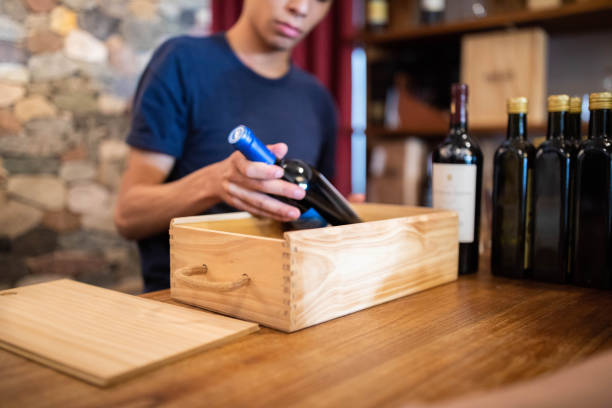Tanker Trucking: The Critical Role it Plays in Transporting Wine & Spirits
Transporting wine and spirits is a delicate art. The bottles we see lining store shelves have traveled far before making it into the hands of customers. Yet, the process behind getting them there is more complex than it seems, especially when dealing with bulk shipments. Enter tanker trucking, the unsung hero that ensures your favorite wines and spirits arrive at their destination safely, efficiently, and in perfect condition.
Why Tanker Trucks?
When we think of wine and spirits, we often picture beautifully designed bottles, but before those bottles are filled and labeled, these beverages need to be transported in bulk. That’s where tanker trucking come into play.
Tanker trucks are specialized vehicles designed to transport large volumes of liquid, making them ideal for moving wine and spirits across long distances. The reasons behind this choice are compelling:
- Cost-efficiency – Bulk transport in tankers is far more economical than shipping thousands of bottles individually.
- Quality preservation – Tankers are designed to maintain consistent temperatures, ensuring that the wine or spirits don’t spoil during transit.
- Speed – Time is of the essence when transporting perishable goods like wine, and tanker trucks offer a faster and more efficient means of transport.
Specialized Design for Fragile Cargo
Wine and spirits aren’t just any liquids—they’re sensitive products that require special care. The design of tanker trucks used for transporting these liquids is tailored to the unique requirements of alcoholic beverages.
- Temperature Control
One of the most critical factors in the transportation of wine and spirits is maintaining the right temperature. Extreme heat or cold can alter the taste and quality of these beverages, so tanker trucks are often equipped with insulation and sometimes even temperature control systems. This ensures that the product remains at an optimal temperature from point A to point B.
- Sanitary Conditions
Hygiene is paramount in the transport of consumable liquids. Tanker trucks are built to strict sanitary standards, using food-grade stainless steel that’s easy to clean and doesn’t react with the liquid being transported. After each trip, the tanks are meticulously cleaned to ensure there’s no contamination that could affect the quality of the next load.
- Capacity and Flexibility
These tankers are designed to hold large quantities of liquid, often up to thousands of gallons. Whether it’s a large batch of whiskey heading to a bottling plant or a tanker full of wine destined for a winery, these vehicles are built to handle it. The flexibility of tankers also allows for different compartments, so multiple types of spirits or wines can be transported simultaneously without mixing.
Ensuring Safety and Compliance
It’s not just about getting the wine or spirits from one place to another—it’s about doing so safely and legally. Alcoholic beverages are highly regulated, and tanker trucking companies need to navigate a complex web of rules and regulations to ensure compliance.
- Driver Expertise
Transporting alcohol is no simple task. The drivers handling these tanker trucks are required to have specialized training and certifications. They need to understand the nuances of their cargo, from handling the tanker’s weight distribution to knowing what to do in case of an emergency. After all, a load of thousands of gallons of liquid is no small thing!
- Regulatory Compliance
Alcohol transportation is subject to a maze of federal, state, and local regulations, depending on the region. These regulations often cover everything from permits and taxes to safety protocols. Tanker trucking companies must stay on top of these requirements to ensure every delivery is legally compliant, avoiding fines or delays.
- Safety Measures
Safety is a top priority. Tanker trucks transporting wine and spirits are equipped with a range of safety features, from pressure relief valves to prevent tank over-pressurization, to reinforced structures that reduce the risk of spills or accidents. Additionally, routes are often meticulously planned to avoid unnecessary risks, ensuring that the valuable cargo arrives intact.
Environmental Considerations
In an era where sustainability is becoming increasingly important, tanker trucking for wine and spirits transportation is adapting to reduce its environmental impact. Tankers are often more fuel-efficient than other forms of transport because they can move large quantities of product in one trip, reducing the need for multiple vehicles. Additionally, some companies are beginning to explore alternative fuels and greener technologies to make their operations more environmentally friendly.
Efficient bulk transport also reduces the overall carbon footprint of the supply chain. By transporting wine and spirits in tankers, companies can significantly cut down on packaging waste. Imagine the environmental cost of transporting millions of bottles individually, with all the associated packaging materials. Tanker trucking simplifies this by moving liquids in bulk, only bottling them closer to the final destination.
The Global Scale of Tanker Trucking
Wine and spirits aren’t just consumed locally—they’re global commodities. Whether it’s a fine French wine destined for a restaurant in New York or a batch of rum heading to Europe from the Caribbean, tanker trucks play a critical role in international supply chains.
Global shipping often involves a combination of transport methods, with tanker trucks forming a crucial link between ports, production facilities, and distribution centers. The international reach of tanker trucking allows for the efficient flow of wine and spirits across continents, ensuring that the world’s favorite beverages are always within reach.
Raising a Glass to Tanker Trucking
It’s easy to take that glass of wine or your favorite spirit for granted, but behind every sip lies a complex journey. Tanker trucking is at the heart of this process, quietly ensuring that each drop arrives in perfect condition. From maintaining the quality of the liquid to navigating regulatory landscapes and reducing environmental impact, tanker trucking plays a vital role in the global beverage industry.




